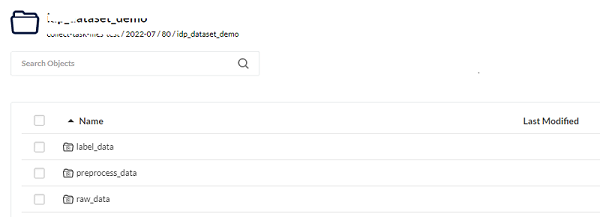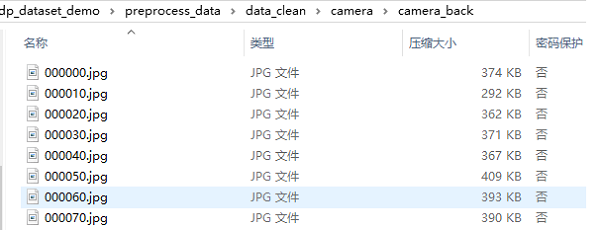将MinIO中的文件夹下载为ZIP文件
公司项目采用MinIO作为数据存储,最近遇到一个需求是将其中的某个文件夹的数据基于其原有的结构下载为ZIP文件,网上有很多下载为ZIP的代码,个人觉得其中好多不够精简,简单记录下自己的实现。
文件夹下载
该文件夹在MinIO中存储的路径为2022-07/80/iodp-dataset-demo,其下包含多个文件夹

在特定文件夹下包含多个数据文件

由于在MinIO中是按照文件夹存储,一开始自己很显然的是想用直接去MinIO官网查看有没有直接下载文件夹的方式,在其官网java-client-api-reference中没有找到支持文件夹下载的方式。
接下来自己通过ListObjectsArgs传入文件夹名称2022-07/80/iodp-dataset-demo的方式想一次性把文件都获取到,在此种方式下程序执行结果为空。
至此,可知道 MinIO不支持原生的文件夹下载,只能按照文件挨个下载,为了获取所有文件,需要通过递归程序实现,相关代码如下
@Log4j2
@Service
public class MinioServiceImpl implements IMinioService {
@Autowired
private MinioClient mClient;
@Override
public InputStream downloadFile(String fileName, String bucket) {
GetObjectArgs getArgs = GetObjectArgs.builder().bucket(bucket).object(fileName).build();
try {
InputStream is = mClient.getObject(getArgs);
return is;
} catch (ErrorResponseException | InsufficientDataException | InternalException | InvalidKeyException
| InvalidResponseException | IOException | NoSuchAlgorithmException | ServerException
| XmlParserException e) {
throw new RuntimeException(e);
}
}
@Override
public List<String> listFolderFiles(String folderName, String bucket) {
List<String> fileList = new ArrayList<>();
listFolderFiles(folderName, bucket, fileList);
return fileList;
}
private void listFolderFiles(String folderName, String bucket, List<String> fileList) {
ListObjectsArgs listArgs = ListObjectsArgs.builder().bucket(bucket).prefix(folderName).build();
Iterable<Result<Item>> results = mClient.listObjects(listArgs);
try {
for (Result<Item> result : results) {
Item item = result.get();
String objectName = item.objectName();
if (item.isDir()) {
// 采用递归的方式遍历文件夹
listFolderFiles(objectName, bucket, fileList);
} else {
fileList.add(objectName);
}
}
} catch (ErrorResponseException | InsufficientDataException | InternalException | InvalidKeyException
| InvalidResponseException | IOException | NoSuchAlgorithmException | ServerException
| XmlParserException e) {
throw new RuntimeException(e);
}
}
}
基于上述代码从MinIO中返回的文件信息类似如下所示:

写入ZIP文件
由于MinIO中返回的文件信息已经具有层级结构,故在进行ZIP压缩时可基于文件路径直接设置其存储位置1
@Override
public void downloadDataset(int id, HttpServletResponse response) {
DatasetModel dsModel = queryDataset(id);
String path = dsModel.getPath();
int prefixLen = StringUtils.substringBeforeLast(path, "/").length();
// 设置文件名
String zipFileName = StringUtils.substringAfterLast(path, "/") + ".zip";
response.setCharacterEncoding("UTF-8");
response.setContentType("application/octet-stream");
try {
response.addHeader("Content-Disposition", "attachment;filename=" + URLEncoder.encode(zipFileName, "UTF-8"));
} catch (UnsupportedEncodingException e) {
throw new RuntimeException(e);
}
List<String> fileList = minioService.listFolderFiles(path, collectFilesBucket);
try (OutputStream out = response.getOutputStream();
ZipOutputStream zs = new ZipOutputStream(new BufferedOutputStream(out))) {
for (String filePath : fileList) {
String fileName = filePath.substring(prefixLen + 1);
InputStream is = minioService.downloadFile(filePath, collectFilesBucket);
ZipEntry entry = new ZipEntry(fileName);
zs.putNextEntry(entry);
IOUtils.copy(is, zs);
zs.closeEntry();
}
zs.setMethod(ZipOutputStream.DEFLATED); //设置压缩方法
} catch (Exception e) {
e.printStackTrace();
}
}
下载后的ZIP文件如下所示,可见其层级结构与MinIO中原始存储的层级结构相同,功能正常实现。

-
通过
new ZipEntry(fileName)在fileName中指定其完整路径即可实现 ↩︎

